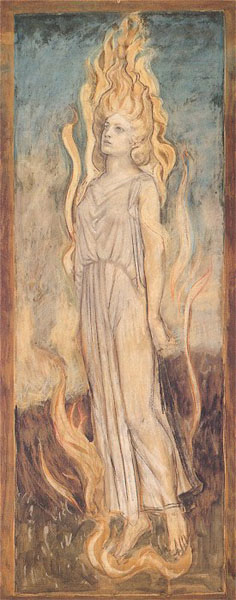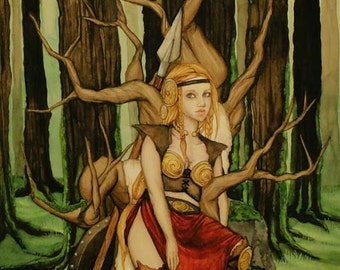Brigantia (goddess)
Brigantia, rarely also Brigindo, Bricta or Brixia, is a Celtic goddess. The name Brigantia is to be understood as a Latin approximation of ancient Celtic name, which is developed as * Briganti. It actually means " the sublime ."
Mythology
Brigantia was the time of Roman rule, the tribal goddess of the Celtic tribe of the Brigantes, of which different tribes were located both in Britain and in Gaul and Gallia Belgica of. She was often portrayed as a serious -looking young woman with helmet, spear, shield and armor. Brigantia but was also known as a nymph - probably because it was regarded as a deity of the country and as a river goddess of the Afon Braint and the River Brent. Although she was mainly worshiped in Britain, as numerous inscriptions testify, her cult was probably also known on the mainland.
The Irish legendary figure of Brigid or Brig is very likely to return to the goddess Brigantia, whose cult could have brought British navigator or Peculiar to Ireland.
In the interpretatio romana Brigantia is also equated with Minerva ( " Minerva Celtic " ) Victoria and carries on a relief as this insignia mural crown, spear and Gorgon. From the time of Antoninus Pius, an invocation as a healing goddess Dea Nympha Brigantia survives in Cumberland ( England). In the Roman fort Blatobulgium in the Scottish Birren ( Dumfries and Galloway, Gaelic: Dùn Phris agus on Gall- Ghaidhealaibh ) a holy place from the 2nd century of Brigantia is obtained, on which it is shown with Minerva's mural crown and Victoria's swing. As a battle and victory goddess it is compared to two inscriptions (Roman Inscriptions of Britain RIB 627 and RIB 628) with Victoria, on a with the North African moon goddess Dea Caelestis (RIB 1131 ).
Her male counterpart is the god Briganitius, is known about the very little.










